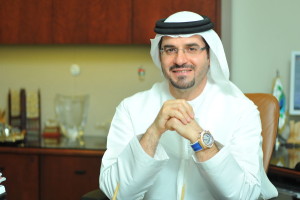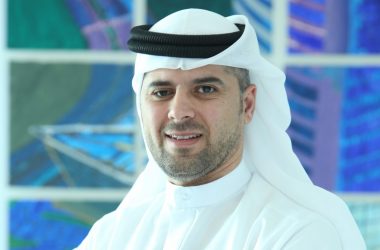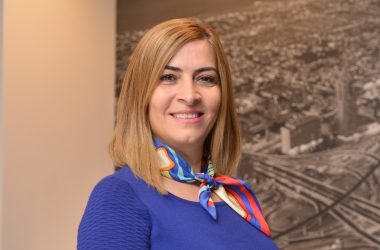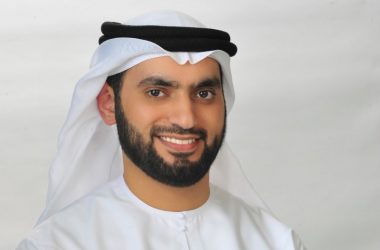
In the summer of 1985, in downtown Ann Arbor, Michigan, Alaeddin Al-Badawna reached breaking point. “I cried,” the now Manager – IT of ADMA-OPCO recalls, “I’ll tell you, I really did.” At 17 years old, Al-Badawna had moved to the United States by himself to attend the University of Michigan. He had arrived that day, in the summer, to improve his English before classes began.
“I arrived in the US, and successfully took a taxi to my dormitory,” he remembers, “but when I arrived, I learned that I had moved in four days too early.” Thankfully, a university staffer took pity on him, and allowed him to move into his dormitory, room 416. “I remember this clearly,” he says, “because this day was a turning point in my life.”
In his excitement of being in a new country, he went out to explore. Later that night, as the sun began to set, the nerves kicked in. “My friends in the UAE always told me to never be out after dark in the US, and I didn’t know where I was.” He resolved to find a policeman and ask to be directed back to his building. “But I couldn’t remember the name of my dormitory.”
On his own, Al-Badawna finally found his way home. Alone, in a dorm room, far from home, Al-Badawna realised that he was at a crossroads. “I could either give up, or I could learn from my mistake,” he says. It is clear today, with his keen attention to detail, that Al-Badawna decided to turn his mistake into an opportunity. “What I learned that day is to plan ahead. I learned that I needed to arm myself with as much information and as many details as I possibly could before moving into a situation.” Al-Badawna has held this as one of his most important philosophies to this day.
His interest in technology, however, blossomed long before that moment in Michigan. He grew up in Abu Dhabi – his father was a secretary to Sheikh Shakhbut. His father was there to celebrate the first oil shipment from Abu Dhabi, and was part of the region’s history. One day, his father came home with a piece of technology that excited Al-Badawna like nothing before. “It was a car phone,” he recalls. “I was amazed that we could drive around and still make phone calls, right from the phone.”
Al-Badawna recognised then that the region was entering an era that would rely heavily on technology. “I wanted to be a part of that,” he says, “I wanted to be on the ground floor of the UAE’s move into the age of technology.”
To that end, he opted to study computer science in university. “My father encouraged me to stay close to home, and to attend university in Al Ain like my older brother had done, but I had other plans,” says Al-Badawna. In keeping with his desire to be first, he was determined to start a family trend of studying abroad. His neighbour was studying at the University of Michigan, and with a bit of advice, he decided that would be his place of study.
He was accepted on the course, and, aside from a few early planning mishaps, his university years were outstanding. So much so, in fact, that upon his graduation in 1989, he was recognised by the Outstanding College Students of America and graduated with honours.
“At that point,” he remembers, “I was offered a number of positions, including one at IBM. As happy as I was to be offered the job, I wanted to return home.” Still, he didn’t forget about Michigan. “Later, I helped my younger brothers go to the University of Michigan, and other universities in the US.”
In 1990, upon his return to the UAE, he was offered a job at GASCO. “I turned it down,” he says, “at the time there was a call to join the army, and I enrolled with the military police.” Two days after joining up, however, ADMA called him and offered him a job. He opted to leave the military police and join ADMA in December of 1990.
He was hired as an Oracle developer in information system planning. In 1990, ADMA was almost completely technology-free. “I brought PCs to the company,” he says, though his early project did not stop there. He also implemented some of the first automated systems in the Gulf.
In 1994, he automated the company’s reception area, a system that remains in place today. He also moved ADMA from using mainframes into a client server architecture. His managers noticed his innovative spirit and moved him forward to technical services and support in 2000.
His upward climb at ADMA continued steadily. In 2002, he was promoted to Head of IT Planning and Projects. There he managed the implementation of a new ERP system in 2003. By 2005, he had been given the newly created position of Department IT Manager.
Finally, in 2006, he was promoted to his current position of CIO. “I have seen a great deal of change in the IT world since I began,” he says. Most notably, he points out that the IT department has gone from being reactive to proactive. “We aren’t just coming around when something breaks and needs fixing,” he explains, “IT has to come up with new innovations to keep the company moving forward.”
In his role as CIO he has introduced a number of new initiatives, including the use of internationally recognised standards and best practices. “I was met with some resistance when I brought in new ideas like that,” he admits, “but part of being in this role is understanding how to change people’s minds.”
Though he strives to remain on the cutting-edge, he still holds the moment in Ann Arbor in mind. “I never take on a new project or solution without planning first. I don’t need to make the same mistakes that others around me have made. If something is not properly tested, or if someone has failed with it before, we simply don’t move forward,” he explains.
His forward thinking and tendancy to plan should not be mistaken for fear or an over cautious tendancy – he still recognises the value in taking risks. “To young CIOs, or IT professionals who want to become a CIO, I remind them to always think outside the box,” he says. Planning and attention to detail are essential, but a clear plan has never stopped Al-Badawna from taking a risk.





